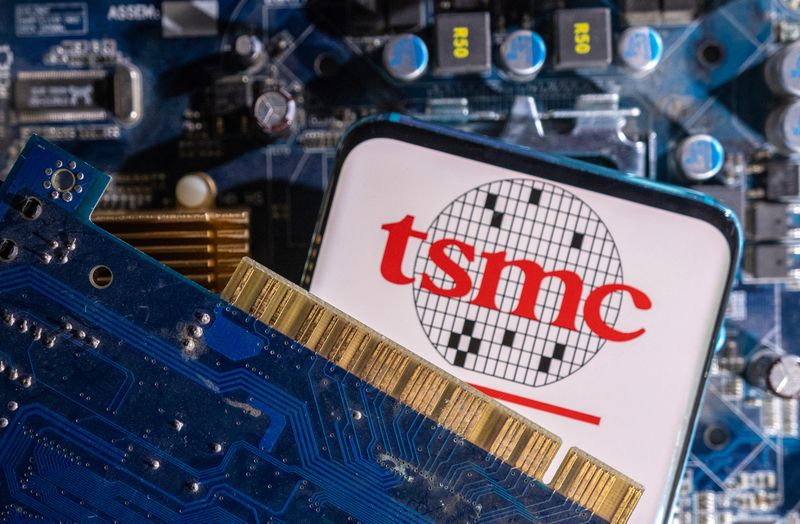By Yimou Lee and Faith Hung
TAIPEI (Reuters) -Taiwanese chipmaker TSMC projected on Thursday more than 20% growth in 2024 revenue on booming demand for high-end chips used in artificial intelligence (AI) applications even as the broader industry deals with weak smartphone and electric vehicle sales.
Taiwan Semiconductor Manufacturing Co Ltd (TSMC), the world's largest contract chipmaker and a major Apple Inc (NASDAQ:AAPL) and Nvidia (NASDAQ:NVDA) supplier, said at an earnings conference that AI represented a major opportunity
"We are a key enabler for AI applications. So far today, everything you saw for AI comes from TSMC," CEO C.C. Wei said at the conference, after the company reported a fourth quarter net profit that beat market expectations.
For advanced packaging, demand was very strong and TSMC can't offer enough capacity to support customers, which will continue to next year, he added.
But Wei said that for the industry overall, he was worried about over-capacity for mature nodes.
"There might be too much capacity being built right now for mature nodes. So the concern on over-capacity is valid," he said, though he added that it was not a concern for TSMC due to strong customer demand for its speciality technologies.
Looking ahead, TSMC said it plans to expand its global manufacturing footprint, with construction at its fab plant in Germany expected to begin in the fourth quarter of this year, while TSMC is still deciding on what technology node to build at a second fab in Arizona.
A first fab in Japan will open next month with volume production in the fourth quarter, while the company was also exploring building a second factory in the country.
It forecast capital spending at $28-$32 billion for this year, in line with 2023, and said it will also expand production at home in Taiwan.
TSMC said it is evaluating building a third fab in the southern Taiwanese city of Kaohsiung, and if it goes ahead all three fabs there will be for advanced 2 nanometre chips, due to strong demand driven by high performance computing and smartphones.
TSMC posted a 19% drop in net profit for the October-December quarter to T$238.7 billion ($7.6 billion) from a particularly strong year-earlier quarter.
The profit, though, beat a T$226.4 billion LSEG SmartEstimate, which is weighted toward forecasts from analysts who are more consistently accurate.
"Our fourth quarter business was supported by the continued strong ramp of our industry-leading 3-nanometer technology," said Wendell Huang, TSMC's chief financial officer.
He said the current quarter would be impacted by seasonality of the smartphone business, which would be partially offset by strength in its high-performance computing segment that includes AI chips.
While the company said 2023 was challenging, it forecast solid growth for this year, adding that it expects inventories to return to a healthy level.
Revenue for 2024 should increase in the low to mid-20% range in U.S. dollar terms, it said.

TSMC's Taipei-listed shares surged 32% last year. The stock rose 1.2% on Thursday ahead of the results versus a 0.4% gain for the benchmark index, giving the company a market value of $478.3 billion.
($1 = 31.5550 Taiwan dollars)